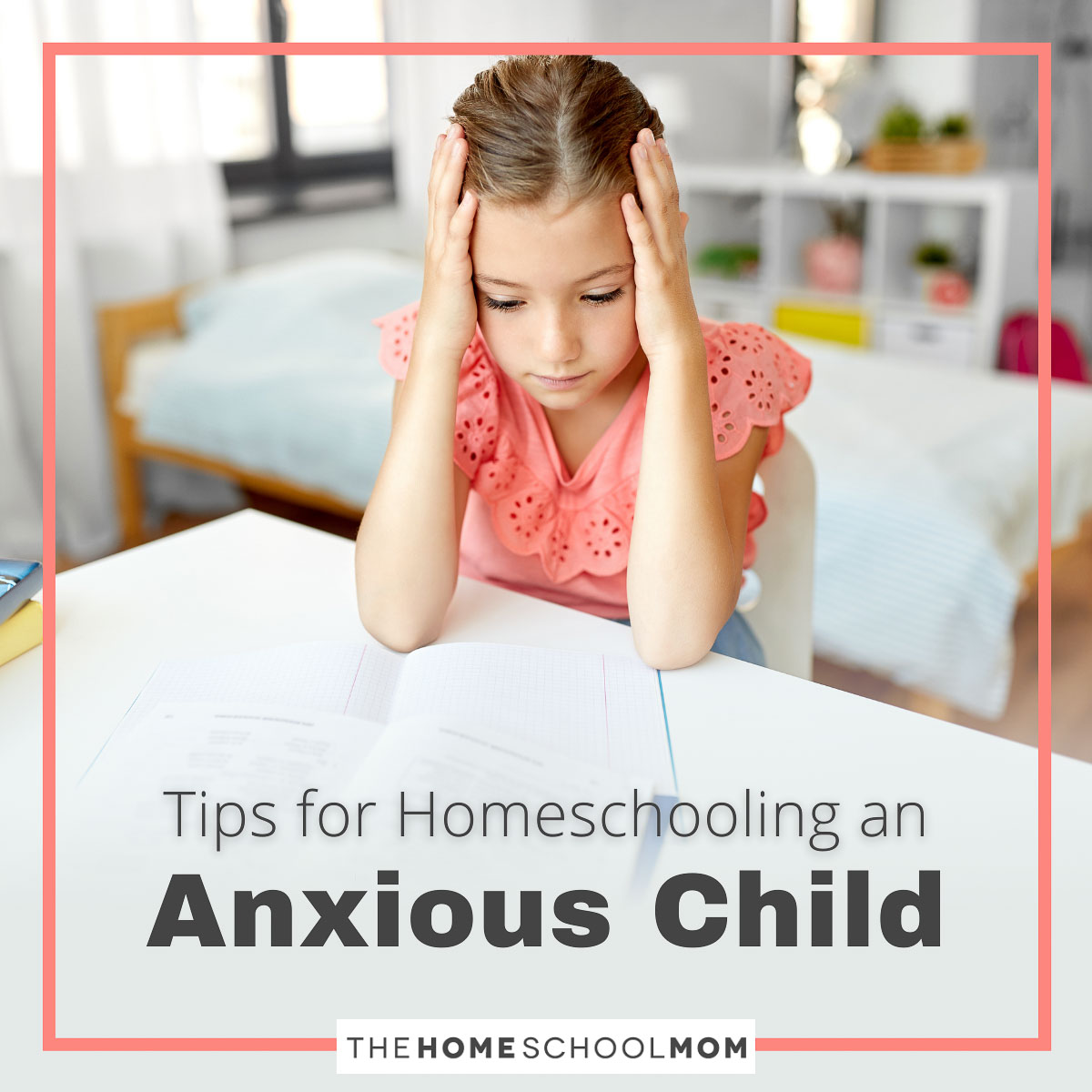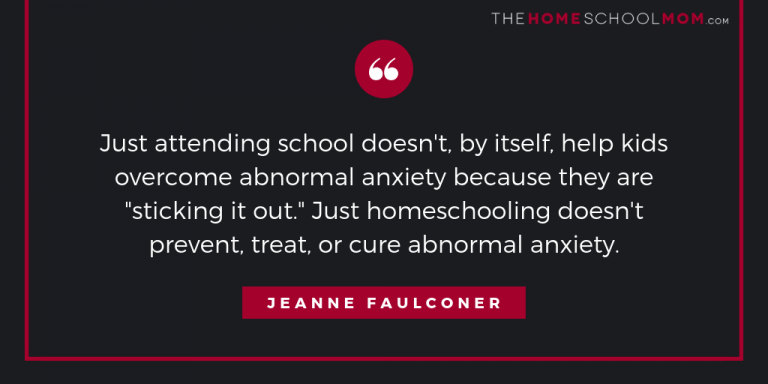Homeschooling an anxious child is a common response to the high stakes testing, stressful early academic lessons, bullying, and other problems that may occur in public school. Sometimes this school anxiety manifests itself as school refusal, and sometimes just getting away from high stress situations that cause anxiety is enough; however, for the child who struggles with abnormal anxiety, more may be needed.

Homeschooling an Anxious Child
Get help
- Combine homeschooling with professional treatment for abnormal anxiety, which may include
- counseling or therapy
- stress management
- focus on self-care (nutrition, sleep, and exercise)
- medication
- Consider cognitive behavior therapy (CBT) for your child, which helps many people manage abnormal anxiety.
- Seek a counselor or therapist who is knowledgeable and unbiased about homeschooling.
- Know that homeschooling brings with it the "Power of Now" - you can do what's right for your child now, even if that means you prioritize mental health over academics.
- Find support for yourself, the parent. Friends, books, counseling, support group, online groups. Parenting an anxious child is hard, and you need someone who understands and information about how to do it.
If you remove your anxious child from school to homeschool
- Remember, removing a child from a negative school situation may reduce stress and thus lower anxiety, but there may be leftover trauma your child might need help with.
- If anxiety was "rational" due to a specific terrible situation related to school, removing a child may be "enough," but you can help her know about and experience other school and school-type situations that are not negative, so she is less likely to over-generalize.
- Know that homeschooling does not automatically or by itself fix anxiety so a child can return to school.
- Remember that not all anxiety is school-related. Some kids who have never been to school have debilitating anxiety. Keep perspective on what homeschooling can do.
- Learn about short-term homeschooling.
- If returning to school after a period of homeschooling is a goal, gradual but increasing exposure is commonly recommended.
- Spend some time deschooling. No, really.
- Focus more on connection than curriculum.
- Choose a curriculum or approach to homeschooling that is different if school ways were creating too much stress
- Do not confuse homebound services offered by your school division with independent homeschooling. The laws are quite different, and in many states, you have to file specific paperwork in order to homeschool. Since kids with debilitating anxiety may have missed a lot of school, lack of the correct paperwork (where required) could trigger truancy charges. Sometimes people think the school administration considers homebound instruction to be the same as homeschooling, and therefore additional paperwork is not necessary, but that may not be true.
- Consider whether a return to school makes sense with the school conditions and level of support your child will face in his precise circumstance. Some students do well in community college, university, and work, despite having had challenges with anxiety while they were in public school.
Consider the specifics of homeschooling teens who have anxiety
- If your child is high school age or will be soon, educate yourself specifically about homeschooling high school. The desire to attend or graduate from public school can be affected by homeschooling during the high school years.
- Learning at home can be much different for teens than you may think. If you have a teen who is stressed over the books-and-tests approach to earning a required credit, just consider this unusual homeschooling approach to earn a credit for Government. You and your teen really can do things like this to cover many subjects, not just Government. Getting to do hands-on learning and not stress over typical high school class requirements may help.
- If your teen is at risk of dropping out of school due to her anxiety, consider helping her rise out of high school instead.
I don't necessarily agree with the internal links specific to homeschooling in this article "Can Homeschooling Help Teens with Anxiety?" However, the article itself is a rare helpful article originating outside the homeschooling community about homeschooling teens who have anxiety.
And here is a story of a homeschooled teen with anxiety and school refusal, for whom homeschooling has played a positive role, along with therapy and treatment.
Adjust your parenting style
- Learn what abnormal anxiety may "look" like. Abnormal anxiety can look like avoidance, reluctance, nervousness, refusal, anger, disobedience, misbehavior, and disrespect.
- Don't punish or use harshness to try to stop anxiety. Kids with abnormal anxiety need help and strategies, not punishment, and harsh parenting makes anxiety worse.
- Disruptive behavior still has to be managed. You don't have to become indulgent or permissive, which can enable avoidance and entrench anxiety. Partner with your child in an authoritative (not "authoritarian") parenting style.
- Remember what people commonly do to cope with normal anxiety doesn't work for pathological anxiety. Resist telling your child to "just get over it," just as you would not tell someone with a broken leg to "just get over it." Compassion, treatment, and problem-solving are called for.
Suggested reading on parenting style:
(affiliate links)
Kids Are Worth It: Giving Your Kids the Gift of Inner Discipline by Barbara Coloroso
How to Talk So Kids Will Listen and Listen So Kids Will Talk by Adele Faber and Elaine Mazlish
The Explosive Child: A New Approach for Understanding and Parenting Easily Frustrated, Chronically Inflexible Children by Ross Greene
Suggestions for homeschooling an anxious child
- If you have a child who doesn't like field trips, it could be related to anxiety. Consider how you can put the feel good into field trips, so your child can stretch herself with new experiences without developing dread.
- Some parents have told me that checklists of assignments have different effects on different children who have anxiety disorder. For some kids, making or using a list helps them feel calm and ordered. For others, seeing a list of assignments or things to do feels overwhelming. Remember your own response to "lists" may not be shared by your anxious child. Some kids do better only knowing about the "next thing" while others do better seeing all the things.
- Give more autonomy when possible. When children have a lower sense of control of their own lives, they are more anxious.
- Certain approaches to homeschooling may allow more autonomy, such as interest-led homeschooling, eclectic or relaxed homeschooling, and unschooling.
- If your child has test anxiety, but your state requires annual assessments for homeschoolers, find out if more holistic homeschool evaluations are acceptable in addition to or instead of standardized tests. (You can choose to address test anxiety as a separate issue rather than in a high stakes situation like end-of-year homeschool assessment).
- Know the pros and cons of online schools. Kids vary greatly in their response to online education. Your child's anxiety may ratchet up or down when an online school is the approach to education.
- Shift the focus from teaching to supporting your child's learning. The wording seems nuanced, but there is a lot of pressure when a child is expected to absorb direct instruction on demand.
- Focus on strengths.
- Spend more time outdoors together, learning, relaxing, getting exercise, and enjoying the natural world. Bird watching works as part of science!
- Nurture connection with your child.
Learn about abnormal anxiety
If you're just learning about abnormal anxiety and how it differs from the ordinary anxiety many of us have sometimes, here are some introductory points:
- Some people are genetically wired with a tendency to be anxious or to have anxiety disorders.
- People often develop anxiety during adolescence, teens, or early twenties. Again, this can be in our genes.
- Trauma and stress can cause, trigger, contribute to, or worsen anxiety.
- Many people have normal anxiety as part of life. Abnormal anxiety, pathological anxiety, and anxiety disorders are different from ordinary anxiety.
- Abnormally anxious people "see" and feel more threat than others, and their thoughts and actions reflect feeling threatened.
- Abnormal anxiety can be mild, moderate, or severe, and severity can vary over time.
- Anxiety can take many forms.
- School refusal can be a symptom of and/or response to anxiety or depression.
- Some negative behaviors can be anxiety masquerading as disobedience, disrespect, anger, lack of social skills, or misbehavior.
- Punishment and harsh parenting don't improve anxiety or help a child get over it. In fact, they factor in as causes of anxiety.
The Bottom Line on School/Homeschooling and Anxiety
Just attending school doesn't, by itself, help kids overcome abnormal anxiety because they are "sticking it out."
Just homeschooling doesn't prevent, treat, or cure abnormal anxiety.





 A popular speaker at homeschooling conferences, business groups, and parents’ groups, Jeanne Potts Faulconer homeschooled her three sons in North Carolina, Mississippi, and Virginia for twenty years. Holding her Master of Arts degree in Communication, Jeanne conducted portfolio evaluations for Virginia homeschoolers for evidence of progress for many years. Jeanne is a former college faculty member, former editor for several publications, news correspondent for WCVE, and former director of Brave Learner Home. She is the contributing editor for TheHomeSchoolMom newsletter and writes the popular Ask Jeanne column addressing homeschool parents' questions here at TheHomeSchoolMom.
A popular speaker at homeschooling conferences, business groups, and parents’ groups, Jeanne Potts Faulconer homeschooled her three sons in North Carolina, Mississippi, and Virginia for twenty years. Holding her Master of Arts degree in Communication, Jeanne conducted portfolio evaluations for Virginia homeschoolers for evidence of progress for many years. Jeanne is a former college faculty member, former editor for several publications, news correspondent for WCVE, and former director of Brave Learner Home. She is the contributing editor for TheHomeSchoolMom newsletter and writes the popular Ask Jeanne column addressing homeschool parents' questions here at TheHomeSchoolMom.
I love homeschooling my children sometimes it’s a bit overwhelming with all of the homeschooling stuff on the web! If it’s possible could someone call me
540-303-3523
Searching for an English course . My children currently attend setonhome.org. Also interested in engineering or stem courses .
Hi Carisa,
Yes, there is a lot of information about homeschooling online! Sometimes the web feels like a rich resource while other times it feels like too much to wade through. TheHomeSchoolMom does not provide telephone consultations right now, but many homeschool organizations have volunteers who will talk to you or answer personal emails. Check out our listing of local and statewide homeschool groups. You may also want to look at our curriculum reviews.
Good luck in your homeschooling!